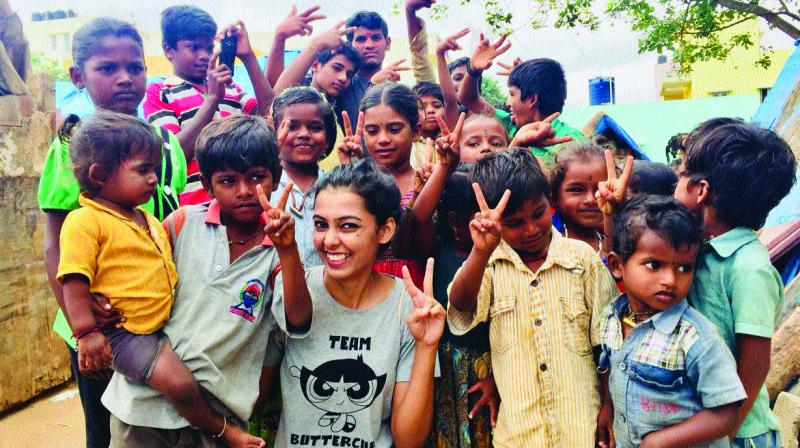SADS, helping donors reach beneficiaries for non-cash donations

Set up in 2015, the Share at Door Step (SADS), a social venture, has developed its own way of bridging nobility with practicality. As a platform through which non-cash donations are ensured to reach the right NGO and to the right beneficiary, Team SADS claims that their way of work makes it easy for donors. The organisation is in pursuit of being synonymous with social change.
SADS has also been a winner of various laurels including the E-Commerce category at the Digital Women Awards (DWA-2017), the Manthan Award (South Asia and Asia Pacific – 2017), Women Entrepreneurs Award (Confederation of Women Entrepreneurs – 2018) and Seaside Startup Summit (Social Track – 2018).
“We equip donors with a convenient and transparent method to ensure trust and transparency in each of their philanthropic exercise,” Anushka Jain, founder of SADS, told Deccan Chronicle. Here excerpts from the interview:
What led to the inception of SADS?
The idea for SADS came when I noticed a big gap between NGOs and donors. My mother used to donate clothes and toys to NGOs on my birthday and I used to wonder why they do this just once a year. I thought my mom was either busy or very lazy, but the real reason was that there was no easy way to make non-monetary donations. I figured out that there is a big gap between NGOs and donors as donors are unsure of NGOs’ requirements, too busy to go to NGOs and have trust issues with NGOs. To fix the gap, I launched SADS.
The journey of SADS started in 2015 with just a few volunteers and two NGO partners in Bengaluru. Currently we have 100-plus NGO partners in nine cities, 40-plus corporate partners and 2.3 lakh happy users across the country. We all have those unwanted belongings – clothes, toys, stationery, furniture, electronics etc.- that can be used by someone in need. Share At Door Step (SADS)is the one of its kind social venture that makes it easy for you to give those items a new life by providing you a convenient and transparent way to donate them to trusted NGOs.
What inspired you?
I was inspired by stories of Sachin Bansal and Binny Bansal who delivered books to initial Flipkart customers themselves. This made me initiate the first 150 pickups myself also helping me to understand the nuances of the industry. The realisation of what donors thought then gave me useful insights into taking SADS to the next level.
What drives members SADS?
We are on our own constant mission to create a world where every re-usable item reaches someone in need. We have tied this along with our vision of changing the culture of ‘throw away’ to ‘give away’ starting from our country and then to other parts of the globe. In our country, due to fast moving fashion, advent of technology and increasing spending ability, we are discarding our clothes in six months (lifetime of five years), electronics in two years (lifetime of 3.5 years) and furniture in three years (lifetime of seven years). All these items could reach over 250 million people living in poverty.
A brief idea on the major outreach programmes that you have initiated...
We have collaborated with various brands to run awareness campaigns. We did #PileForGood with Snapdeal which was a social media campaign to raise awareness about how fast-moving fashion is making us discard clothes quickly and how we can make a big difference by donating them. The campaign reached 8 million people across India. A few other big campaigns that reached millions were #5LakhActsOfGiving and #OneChildOneNotebook
We also worked with a major FMCG brand and one of the biggest hospital chains in Bengaluru. We are now operating in nine cities across the country. We have our donation pickup service only in Bengaluru, but we provide drop off options in other eight cities. We also work with various corporate clients across these nine cities for their collection drives and various employee engagement initiatives. We support over 100 trusted NGOs across the country and have over 2.3 lakh happy users. We also have a team of 12 dedicated employees and 120-150 volunteers.
What has been the greatest learning for SADS?
When I started the organisation, everyone around me including my parents always used to tell me that it’s a nice initiative, but there are very few people who believe in donations. But over the years, I have realised that all those were myths and in real sense people want to donate/give away items that they no longer use but they don’t know how.
What is your expectation of organisation’s growth in the next five years?
In the next five years, we will be working towards making SADS one among the leading social platforms in the country where everyone can come together and make a difference. Eventually, we want to increase our reach across the world and be the brand that stands for social change.

